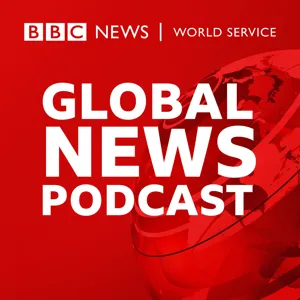Podcast Summary
China's Economy Grew at Its Slowest Pace Since 1976: China, the world's second-largest economy, experienced its second-slowest economic growth since 1976, with a 3% increase in GDP in 2022.
China's economy grew by 3% last year in 2022, making it the second slowest year for economic growth since 1976. This is a significant indicator, as China is the world's second-largest economy. This information comes from a special episode of NPR's "Planet Money," where the hosts discussed various indicators related to China, including its population and its economic growth. The hosts used the tradition of handing out red envelopes during Chinese New Year to introduce the topic. The empty red envelope served as a symbol for the economic situation in China. The hosts also mentioned that the BBC provides valuable information and inspiration for understanding global stories, encouraging listeners to check out their website. The episode highlighted the importance of economic growth indicators, specifically Gross Domestic Product (GDP), in understanding the overall health and direction of a country's economy.
China's Economy Takes a Hit from Strict Zero-COVID Policy: China's economy slowed down due to strict COVID policies causing disruptions and lockdowns, with potential global implications and a decreasing population adding to economic challenges.
China's economy, which had been growing steadily at around 6-8% annually before the pandemic, took a significant hit due to its strict zero-COVID policy. This led to numerous lockdowns and disruptions, making it difficult for both local and foreign companies to operate and deliver goods, resulting in a slowdown of the economy. Recently, China has dropped this policy, but the consequences have been alarming with a large outbreak and potentially underreported death toll. This situation is expected to continue weighing on China's economy and may have implications for the global economy as well. Additionally, China's population, which was 1.41 billion in 2021, has decreased by approximately 850,000 people as of the end of 2022. This demographic shift could have further economic implications.
China's Population Projected to Decline for the First Time in Over 50 Years: China's aging population and declining birth rates could lead to challenges for the country's domestic economy, including supporting an aging population with social safety nets and pension systems, and for the global economy, as China is a major consumer market and the world's factory.
China's population is projected to decline for the first time in over 50 years, which could have significant implications for both China's domestic and the global economy. With around 1.4 billion people, China is home to approximately 18% of the world's population. This demographic shift is particularly noteworthy because China last experienced a population decline during the late seventies and early eighties when it implemented the one child policy. Despite relaxing the policy in 2016, the aging population and declining birth rates persist. This trend poses challenges for China as it requires supporting an aging population with social safety nets and pension systems. Moreover, China's role as the world's factory and a major consumer market adds to the global implications of this demographic shift. Local governments in China are taking steps to address the issue by expanding maternity leave and offering subsidies to families having a third child. However, rising costs for childcare and housing remain significant barriers for families considering having more children.
Marvel movies' return to Chinese theaters signals improving relations: Marvel movies' absence from Chinese theaters was seen as a de facto ban due to geopolitical tensions. Their return could indicate a thawing of relations and increased cultural exchange, potentially leading to economic cooperation and reduced tensions.
The approval of two Marvel movies for release in Chinese theaters next month could be a significant sign of improving relations between China and Hollywood. This is important because China has been a major market for Marvel movies, accounting for around 10-20% of their box office revenue. However, the last Marvel movie to be approved for release in China was in 2019, and the absence of these films was seen as a de facto ban due to geopolitical tensions and Beijing's efforts to promote the local film industry. The return of Marvel movies to Chinese theaters could indicate a thawing of relations and a shift towards greater cultural exchange between the two countries. This is a positive sign, as it could lead to increased economic cooperation and a reduction in tensions.
Positive signs for international business and cooperation between China and the US: China easing COVID-19 restrictions and constructive dialogue with US on economic matters signal a hopeful trend for international trade and cooperation, with potential reopening of Chinese markets and constructive meetings between officials.
The resumption of Marvel Studios' film production in China could be a positive sign for international business and cooperation between China and the US. This comes at a time when China has started to ease some of its COVID-19 restrictions and has reportedly shown constructive dialogue with the US in economic matters. The potential reopening of Chinese markets to Australian coal imports and the constructive meeting between Janet Yellen and Chinese Vice Premier Liu He are also indicators of this trend. However, the continuation of this trend is uncertain, but it's a hopeful sign for the future of international trade and cooperation. This comes as real estate assets become available at discounted prices due to high interest rates, making it an interesting time for investment through platforms like Fundrise.






